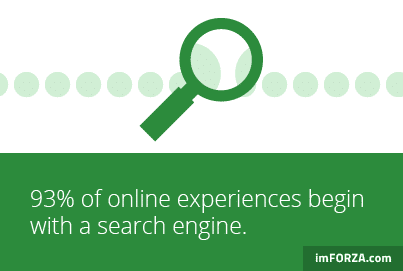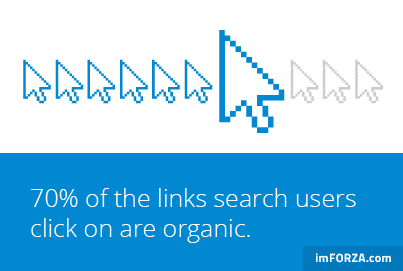

You need traffic to your website and it's no secret that optimising your website for search traffic is an obvious way to go.

Key takeaways:
“Successful SEO is not about tricking Google. It’s about PARTNERING with Google to provide the best search results for Google’s users.”
– Phil Frost, Main Street ROI

First off you need to understand that working on the search optimisation for your website is not a magic bullet that guarantees more traffic. Just by increasing your ranking and where your website appears on Google, doesn't mean you're going to get a flood of traffic.
“My rule of thumb is build a site for a user, not a spider.”
- Dave Naylor (@DaveNaylor), Bronco.co.uk Managing Director
It's also important to note that being top of any search engine never ever guarantees more sales and customers.
If you're at the top of Google for the keyword “shoes”, you might think that this means more awesome traffic and more customers for sure.
1.5 million people a MONTH search for the term shoes. Even if you captured 1% of that search market, that's 1500 clicks!
True, but why are they searching for shoes? Do they want images of shoes? Do they want to buy or sell? Are they browsing or getting ideas? There's NO indication of what they want and why they want to visit your site.
Broad keywords aren't always productive, they're really hard to rank for AND there isn't any strategy behind them.
"London based florist" might capture your immediate geographic ranking (if you're a London-based florist), but how many people are searching for that?
We at Elixir DO believe that you should focus on a geographic area if you're tied to one. But don't think that you always have to think local.
Being too specific could limit the number of people that are searching for your business. Often businesses are guilty of assuming that their customers know exactly what they're looking for. Or, that the terminology you use is known by your customers.
Proper keyword research! It doesn't take a genius to spend a little time researching the right keywords for your business. Whilst not a hard thing to do, it can be tedious. However there are no short cuts.
“Better content is outweighing more content.”
– Rand Fishkin
Businesses make many assumptions with no real basis or merit. Do people actually search for your business name? Be realistic. Unless you're Apple or Nike, they probably don't.
Typically people search or 'Google' questions to help them solve a problem. Or they're looking for a specific product.
Search question examples:
Understanding what your customers and users want to learn and know, is exactly how you should be targeting your SEO.
Now comes the tricky part - actually working on your site to build your search engine rankings. It's not about the
What you need to do is create and write content that ANSWERS the questions that people are SEARCHING for. Google is all about relevance and give priority to content it deems is relevant. So, write
People might moan about algorithms, content updates, spider-bots etc. etc. Don't worry about keeping up with Google or Bing's employees. Assume customers want to get the most relevant articles, posts and products in front of them. Your job is to make content that people want to read, they will then start to find you.
Having a consistent blog post structure for your posts is a really fast way to build content that does 3 things.
If you're struggling to create a blog post format, feel free to copy ours.
Summary - use a short sentence to introduce the post. For example “in this post we talk about topic” or “if you read this you'll be able to result”.
Quote - search the internet for a quote to use relating to what you're talking about. There's always something written somewhere that you can quote and use. You could also link back to that article for sweet SEO gains.
Key takeaways- List the 3 key points that you're covering off in your article
Key point 1 - write a few paragraphs explaining the top 3 learning points for your topic. Give answers, show solutions and explain how to get results.
Key point 2 ...
Key point 3 ...
Conclusion - Write a brief summary. The easiest way is to highlight your favourite point in the blog and turn an objection.
For example, “my favourite part about cleaning a shower is that it's easier and quicker than you think. You can just spray and leave it and you're done!"
Next steps - Give next steps if they want to take it a step further. Our favourite line is “if you're serious about this topic, then you need to...” then give an email address, a lead magnet or a something for them to follow up with.
Posting regular content is key to building trust with search engines and your customers alike. A posting schedule is easier to stick to when you're writing regular content. Feel free to use our calendar below.
We find writing a couple of blog posts a week and then only publishing one is a great way to give yourself some space when you really can't write anything.
Monday - brainstorm 5 ideas to write about. Common questions, things they should know etc.
Tuesday - Write out the structure for both blog posts. Use our framework above
Wednesday - Write the first post
Thursday - Publish a post
Friday - Write the second post and schedule it for another time
Choosing topics is probably the easiest part of creating content. You have 3 main areas to find ideas.
We actually find it helpful to not keep everything we think of. Whenever we brainstorm 5 (or 50!) ideas, whatever we haven't written that week, we'll discard.
If it's really a good idea, we'll think of it again, or come back to it.
So there we go! The truth about SEO is writing content that people want to read. Make sure to update and submit your new sitemap everytime you publish new content (although you can automate this - or we can show you).
Our favourite part about this is that SEO doesn't have to be hard. If you've got a process and a structure, you can rank your content really quick. Just keep in mind that you need to commit. If you're not really ready to write and create content regularly, then you're not going to get the content you want.
Not sure where to start? If you're serious about getting more traffic from your SEO then you need to check out our SEO traffic checklist. It's totally free and will hugely help you start to tackle this area. Click the button below to get started.